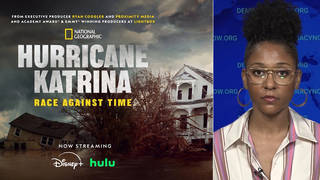
Topics
Annette Addison speaks at the Bush crimes commission about her harrowing experience shared with her sister during the aftermath of Hurricane Katrina. She also recounts her son’s ordeal as a prisoner in Orleans Parish Prison. [includes rush transcript]
- Annette Addison, survived the devastation in New Orleans and rescued people as her son struggled to survive inside Orleans Parish Prison.
- Bush Crimes Commission
Transcript
AMY GOODMAN: We turn now to Annette Addison, who survived the Hurricane Katrina in New Orleans and rescued people as her son struggled to survive inside the Orleans Parish Prison.
ANNETTE ADDISON: During the Katrina disaster, I experienced something that I never imagined in my life. I experienced the neglect of the ones that was supposed to be there for us, like the army, the fire people, the police. They was there, but they did not assist us. And I also went through, with my sister, we went through a struggle without lights and water for three days and three nights. Example, we didn’t have no water, we went to the fire station, and we asked the firemen, do they have any water that they can give us to drink. And the firemen told me and my sister that they didn’t have any water to give us. They only had enough for theirself. And so me and my sister, we walked away, devastating. I kept passing out because of exhaustion, depressed, oppressed.
And then during that, my son was in Orleans Parish Prison. And I was just wounded and hurt, because before Katrina really hit, I was waiting for my son. He was due to get out of Orleans Parish Prison two days before Katrina hit. But Katrina hit, and he did not get out. But when I did get in touch with my son, which it took a while, because they took the prisoners, they put them on the bridge, but during that time, I didn’t know where he was at the time, because they took the prisoners and they didn’t let nobody know where they had taken the prisoners. And I had to go on the internet with some more peoples to find my son. And when I did, he was in Monroe, Louisiana at Wichita Correctional Center.
My son said that while he was in prison, he experienced a shooting, he experienced dead bodies that they had to walk over through the water. Some of the cells the guards did not open; they just left the prisoners there to die. If my son didn’t know how to swim, he would have died himself. Many of the prisoners bust out windows to survive, jumping out windows. And, of course, the police began to shoot them, and they died, also.
When my son was taken out of Orleans Parish Prison, they took and they put him on the bridge for so many hours. And the water, the polluted water and the clothes that they had on, they made them keep them clothes on for three days. And from that, my son have fungus up both of his legs, on his arms, and it began to spread up on his lip.
And while my son was incarcerated in Wichita, and I did located my son, me and my uncle, we drove up there, because they said they had lost all the papers of the prisoners. And they didn’t have no record of no — nothing on him. And I called Wichita to get me a bondsman to get him out. So, the bondsman had to go to Baton Rouge to place the bond before they can even release him, because they didn’t want to release him. Nevertheless, me and my uncle drove up there. And he was released. But I had to pay $2500 in order for him to be bonded out.
When he was bonded out, we went back to Houston, Texas, where he was seen by a doctor. They said it was fungus growing underneath his skin, big burrows. They gave him some cream to rub on them, which the cream helped a little bit, but he’s just spotted up all over his body in burrows, so the cream is really not doing him any good. And for me to see that on my son —
And not only that, for what me and my sister went through during this disaster — my sister and I, we struggled to survive our own self. And if it had not been for my brother — 15 carloads I sent. I’m a mother of five kids, and I take care of my niece — two of my nieces. And we sent them ahead before Katrina even must hit, to Houston. Now, during that time, they had 15 cars driving to Houston. But nevertheless, one of my brothers turned back around, which me and my sister did not know nothing about. I said that to say this: If it had not been for my brother turning back around and the grace of God, three days later he came looking for me and my sister, and he found us. But when he found us, his car was flooded. The seats were soaking wet. We had to put blankets on the seat, garbage bags. And that’s how we made it to Houston.
But, in the meantime, I’m struggling. I have nightmares. My heart is broken. I’m aching as I’m speaking right now, because of the suffering. And during the struggle that me and my sister went through in waiting for my son, my sister had two nervous breakdowns when we arrived in Houston, because of the disaster and the way we was treated in New Orleans during this period. Many of my neighbors died, many of my church friends died, also.
AMY GOODMAN: Annette Addison. She survived the Hurricane Katrina in New Orleans.












Media Options